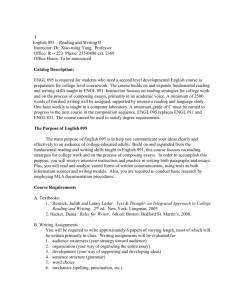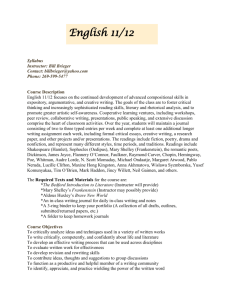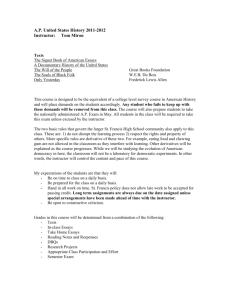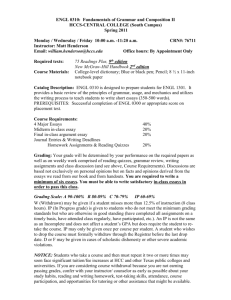ENGLISH 101—English Composition I
advertisement
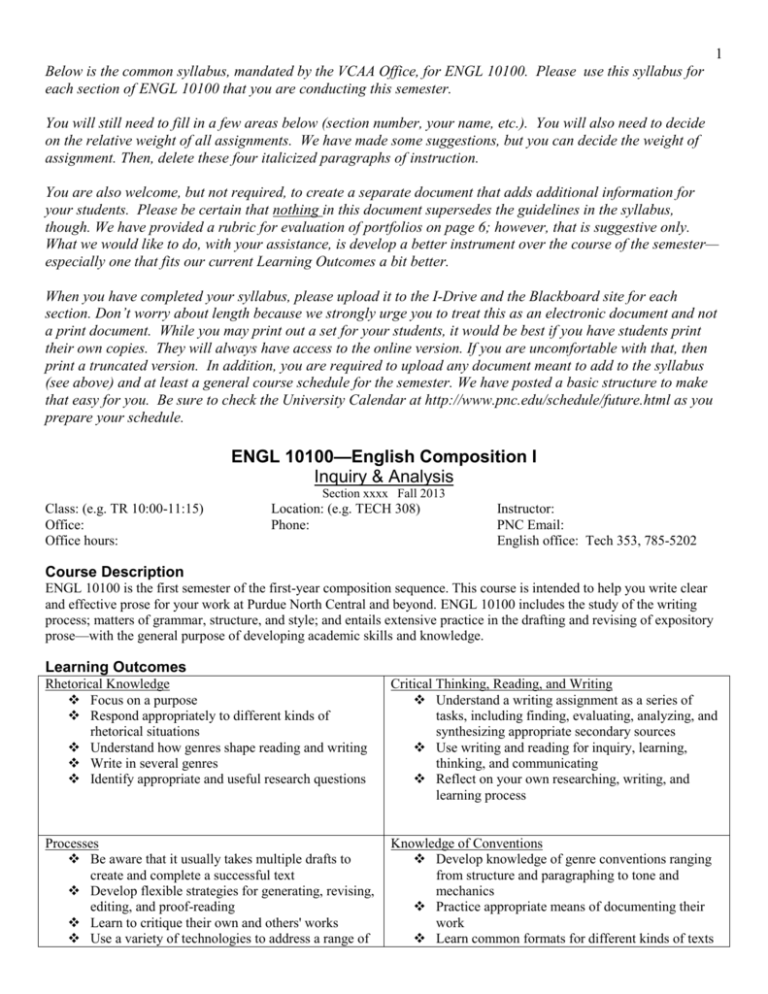
1 Below is the common syllabus, mandated by the VCAA Office, for ENGL 10100. Please use this syllabus for each section of ENGL 10100 that you are conducting this semester. You will still need to fill in a few areas below (section number, your name, etc.). You will also need to decide on the relative weight of all assignments. We have made some suggestions, but you can decide the weight of assignment. Then, delete these four italicized paragraphs of instruction. You are also welcome, but not required, to create a separate document that adds additional information for your students. Please be certain that nothing in this document supersedes the guidelines in the syllabus, though. We have provided a rubric for evaluation of portfolios on page 6; however, that is suggestive only. What we would like to do, with your assistance, is develop a better instrument over the course of the semester— especially one that fits our current Learning Outcomes a bit better. When you have completed your syllabus, please upload it to the I-Drive and the Blackboard site for each section. Don’t worry about length because we strongly urge you to treat this as an electronic document and not a print document. While you may print out a set for your students, it would be best if you have students print their own copies. They will always have access to the online version. If you are uncomfortable with that, then print a truncated version. In addition, you are required to upload any document meant to add to the syllabus (see above) and at least a general course schedule for the semester. We have posted a basic structure to make that easy for you. Be sure to check the University Calendar at http://www.pnc.edu/schedule/future.html as you prepare your schedule. ENGL 10100—English Composition I Inquiry & Analysis Section xxxx Fall 2013 Class: (e.g. TR 10:00-11:15) Office: Office hours: Location: (e.g. TECH 308) Phone: Instructor: PNC Email: English office: Tech 353, 785-5202 Course Description ENGL 10100 is the first semester of the first-year composition sequence. This course is intended to help you write clear and effective prose for your work at Purdue North Central and beyond. ENGL 10100 includes the study of the writing process; matters of grammar, structure, and style; and entails extensive practice in the drafting and revising of expository prose—with the general purpose of developing academic skills and knowledge. Learning Outcomes Rhetorical Knowledge Focus on a purpose Respond appropriately to different kinds of rhetorical situations Understand how genres shape reading and writing Write in several genres Identify appropriate and useful research questions Critical Thinking, Reading, and Writing Understand a writing assignment as a series of tasks, including finding, evaluating, analyzing, and synthesizing appropriate secondary sources Use writing and reading for inquiry, learning, thinking, and communicating Reflect on your own researching, writing, and learning process Processes Be aware that it usually takes multiple drafts to create and complete a successful text Develop flexible strategies for generating, revising, editing, and proof-reading Learn to critique their own and others' works Use a variety of technologies to address a range of Knowledge of Conventions Develop knowledge of genre conventions ranging from structure and paragraphing to tone and mechanics Practice appropriate means of documenting their work Learn common formats for different kinds of texts 2 Begin controlling such surface features as syntax, grammar, punctuation, and spelling audiences Composing in Electronic Environments Use electronic environments for drafting, reviewing, revising, editing, and sharing texts Locate, evaluate, organize, and use research material collected from electronic sources Course Materials: Channell and Crusius. Engaging Questions: A Guide to Writing (Custom Edition). McGraw-Hill. 2012 The Merriam-Webster English Dictionary. Rev ed. New York, Merriam-Webster, 2004. (Recommended) Internet Resources Blackboard: http://blackboard.purdue.edu PNCLibrary: http://www.pnc.edu/depts/ls/index.html PNC Writing Center: http://www.pnc.edu/ll/writing Purdue’s OWL: http://owl.english.purdue.edu H- and I- Drive Access: https://home.pnc.edu/NetStorage Policies & Suggestions Reading Requirements You should expect to read and refer to your textbook and handbook often. Some of the reading you will do will involve the reading of essays related to the paper you are working on. Grammar and style Grammar will be covered throughout the semester as determined by your instructor. At the very least, you are responsible for identifying and correcting sentence fragments, run-on sentence, fused sentences, and comma splices. Your instructor will also help you learn about style throughout the semester and will refer you to the adopted handbook. Special Accommodations If you have a disability that will require accommodation over the course of the semester, please notify the instructor as soon as possible so that your needs can be discussed. If you have not done so already, please also provide appropriate documentation and request accommodations with the Disability Services Coordinator, SWRZ 38, (219) 785-5374. Assignment Format All final drafts should be typed according to “MLA Format for Page Layout” guidelines provided on our website http://www.pnc.edu/engl/mla.html. Late Work Policy Late work is unacceptable. However, individual instructors will determine their own policies on penalizing late work. Plagiarism A detailed explanation of plagiarism may be found on our website http://www.pnc.edu/engl/plagiarism.html. A student who plagiarizes may receive an F for the course or even be dismissed from the university. Computer Classroom Protocol As hard as it may be, you must refrain from using your computer at inappropriate times. No keyboarding or printing should take place during lecture and discussion times and no checking of e-mail or surfing the Web is allowed during class time unless requested by the instructor for research purposes. If a student is using the Internet, flipping through the various drives, updating his/her desktop appearance, e-mailing, chatting on line, or instant messaging, the student will be asked to leave and the absence will be considered unexcused. No food or drink is allowed in any computer lab. Additional Information Please arrive on time for class and stay until finished. 3 Any disagreement over grades must be accompanied by a one-page statement identifying the problem with the current grade and what grade should have been given, listing the strengths in the composition which were overlooked, and addressing the compositional concerns written by the instructor. All cell phones and pagers must be turned off during class. Failing to follow this guideline will cause the student to be asked to leave, and the absence will be considered unexcused. Note: You can of course ask your instructor for permission to set your cell phone to “vibrate” if you are anticipate an emergency call—you must ask permission at the start of class, though. Attendance Students are expected to be present for every meeting of the class. Individual instructors determine whether absences may be excused for illness, death in the family, or official university functions, but they are not required to excuse such absences. Federal regulations require that faculty report all students who miss more than two successive class sessions to the Office of the Dean of Students for appropriate action. A student who finds that he or she is unable to attend the class faithfully should consult with an advisor about withdrawing from the course. When a student misses a class, it is his or her responsibility to get class notes and assignments from other students, and consult with the instructor about making up any missed work. Work that is not submitted on the due dates because of absence from class will be penalized, unless students have made satisfactory arrangements with their professors prior to the due date. Absence is no excuse for late or missing work. How Unexcused Absences Will Impact Your Final Grade Classes that meet three times a week 3 absences = reduction of 1 letter grade 4-6 absences = reduction of 2 letter grades 7 or more absences = failure in course Classes that meet twice a week 2 absences = reduction of 1 letter grade 3-4 absences = reduction of 2 letter grades 5 or more absences = failure in course Classes that meet once a week 1 absence = reduction of 1 letter grade 2 absences = reduction of 2 letter grades 3 or more absences = failure in course Overview of ENGL 10100 Assignments Here are the basic requirements for ENGL 10100. Experienced faculty will write their syllabi according to meet these requirements. A complete syllabus will be provided to new limited-term lecturers and any other interested faculty. Writing Assignments (approx. 60-70% of semester grade) • At least 5,000 words of polished prose (typically, this would be the total number of words in final drafts) • At least one writing project will cite sources that are documented according to MLA guidelines • By the end of the semester, all assignments should have completed the required learning outcomes for ENGL 10100: • Types of essays: Narrative Profile Criteria-Base Evaluation, e.g. movie review, restaurant review Textual Analysis Rhetorical Analysis Media Analysis Process Analysis Reflection Description Proposal Problem/Solution Arguing a Position 4 Process assignments (approx. 30% of semester grade)—work that enhances development of theses, audience awareness, and various rhetorical skills. This work often focuses on prewriting and revision. Assignments that familiarize students with library research should be offered. Reading Critical reading of an array of texts (little or no fiction, poetry, or drama) Proofreading and editing At the very least, students in English 10100 must present their final drafts in Standard Written English Evaluation Instructors will evaluate student work and assign appropriate grades (new faculty must attend a calibration workshop at the start of their first semester). Possible Breakdowns: 60% Portfolio 20% In-class Writing and other in-class activities 10% Mini-portfolios 10% Final Presentation 10% 20% 10% 60% Class Participation (Peer Reviews, written Revision Plans, Early Drafts) Weblog Assignments (from They Say/I Say) Weekly Source Reports Portfolio 10% 15% 75% Writing Journal Attendance and Participation Writing Portfolio (submitted at the end of the semester) *****If the PNC website is not available for more than twelve hours (power outage in Westville, server is down), you can find information about your class at the PNC English Department Facebook site. Course Number / Title, Semester, Course Schedule List the agenda for the semester including when and where the final exam will be held. Indicate the schedule is subject to change with fair notice and how the notice will be made available. Week 1 2 3 4 5 Date Topics, Readings, Assignments, Deadlines 5 Week Date Topics, Readings, Assignments, Deadlines 6 7 8 9 10 11 12 13 14 15 16 Final Exam Venue and Time 6 ENGL 10100 Portfolio Rubric This rubric is a set of guidelines which your instructor will use to evaluate your writing. It describes the qualities your instructor will look for in five important areas: Purpose/Audience, Topic/Thesis, Organization, Prose, and Process. In each column, you will find a general description of what an “A,” “B,” “C,” “D,” or “F” portfolio will look like in terms of one of those five aspects. These descriptions are not meant to be read as items on a checklist but as indications of what a typical A, B, C, D, or F portfolio should look like. It is likely that your own writing has problems in some areas which are partially balanced out by successes in other areas; your instructor will use these descriptions to guide his or her evaluation of the quality of the portfolio as a whole. Criteria A Purpose/ Essays Audience fulfill the assignments in a fresh and mature manner establish the writer's stance with attention and sensitivity to audience, purpose, and context when appropriate to the assignments, demonstrate expertise in employing appeals to ethos, logos, and pathos B Essays follow and fulfill assignments establish the writer's stance demonstrate a clear sense of audience, purpose, and context C Essays follow the assignments demonstrate some sense of audience and purpose Topic/ Essays Essays Essays Thesis have clearly defined have fairly well have only generally and focused topics defined and focused defined topics topics have clear theses have only general that are supported have thesis thesis statements with specific (and statements which are make responsible use appropriate) adequate but could be of supporting evidence, examples, sharpened evidence which may and details present thorough and be obvious and easily use outside sources more than adequate accessible carefully and cite reasoning and demonstrate little appropriately support awareness of the demonstrate valid demonstrate a topics’ complexities reasoning, good thoughtful awareness or other points of judgment, and an of complexity and view awareness of the other points of view need better topic's complexities development, organization, and reasoning D F Essays Essays attempt to follow are inappropriate in the assignments terms of the purposes of the demonstrate little assignments and awareness of their rhetorical rhetorical situation situations may over- or under-estimate (or show no clear purpose or direction ignore) the audience's prior knowledge, assumptions, or beliefs may show little sense of purpose Essays may have no thesis statements (or, at best, flawed ones) fail to give obvious evidence may present irrelevant evidence inadequately interpret evidence demonstrate insufficient understanding of the rhetorical situation may rely too heavily on evidence from published sources or lectures without adding original analysis Essays fall seriously short of the minimum length requirements are insufficiently developed do not go beyond the obvious 7 Criteria A B C D F Organ- Essays Essays Essays Essays Essays ization use organizing have an effective are organized in a exhibit deficient are plagued by more strategies introduction and fairly clear way organization than one of the appropriate to conclusion organizational could be outlined by a introductions or purpose and subject present information deficiencies of a D reader, despite conclusions are essay: i.e., use introduction to in a logical order occasional lack of not clearly marked introductions or establish context, topic sentences or functional use well-chosen conclusions are not purpose, and transitions and topic have adequately paragraphs are clearly marked or audience sentences developed and neither coherently functional; use strong, appropriately divided developed nor divide paragraphs paragraphs are engaging topic paragraphs arranged logically neither coherently sentences make transitions topic sentences are provides support for developed nor present well which may be consistently thesis, but may need arranged; topic developed mechanical but foster missing, murky, or to do so in more sentences are paragraphs which coherence inappropriate detail, more consistently progress logically consistently, and/or transitions are missing, murky, or from what precedes more precisely missing or flawed. inappropriate; them transitions are present conclusions missing or flawed. which go beyond mere restatement of the introduction Prose Essays Essays Essays Essays Essays contain clear, contain clear and exhibit competent may have contain numerous readable, and readable prose expression numerous and and consistent sometimes consistent errors errors of spelling, use sentence use relatively simple memorable prose in spelling, usage, usage, and structure appropriate sentence structure , and punctuation punctuation which contain few surface for educated readers, relying on simple and that reveal hinder errors, none of including appropriate compound sentences unfamiliarity with communication which seriously use of subordination, are generally free of Standard Written undermines the emphasis, sentence sentence-level errors English (or a lack overall effectiveness variety, and modifiers make correct though of careful of the paper for exhibit few sentencelimited word choices proofreading) educated readers level errors contain errors in exhibit stylistic use precise and spelling, usage, and grace and flourishes appropriate punctuation revealing (subordination, vocabulary unfamiliarity with variation of contain punctuation, Standard Written sentence and usage, and spelling English paragraph lengths, conforming to interesting Standard Written vocabulary) English Process Portfolio as a whole demonstrates creative, flexible, and effective revision at both the global and local levels demonstrates familiarity with several methods for generating material (e.g., freewriting, outlining, clustering, etc.) exhibits outstanding improvement in writing over time Portfolio as a whole Portfolio as a whole Portfolio as a whole Portfolio as a whole demonstrates demonstrates some fails to fails to demonstrate effective revision at effective revision at demonstrate any revision both the global and the global level effective revision does not local levels at any but a demonstrates demonstrate superficial level demonstrates familiarity with at familiarity with familiarity with at least one method of does not methods of least two methods for generating material demonstrate generating material generating material (e.g., freewriting, familiarity with does not exhibit any (e.g., freewriting, outlining, clustering.) methods of improvement in outlining, clustering, may not exhibit clear generating writing over time etc.) material improvement in exhibits improvement writing over time does not exhibit in writing over time clear improvement in writing over time
